Aspirin, or acetylsalicylic acid, is one of the cheapest, oldest, and most widely used over-the-counter medications. (1) It is classified as a nonsteroidal anti-inflammatory drug (NSAID) that can help relieve several common ailments including aches or pains, fever, (2) and swelling.
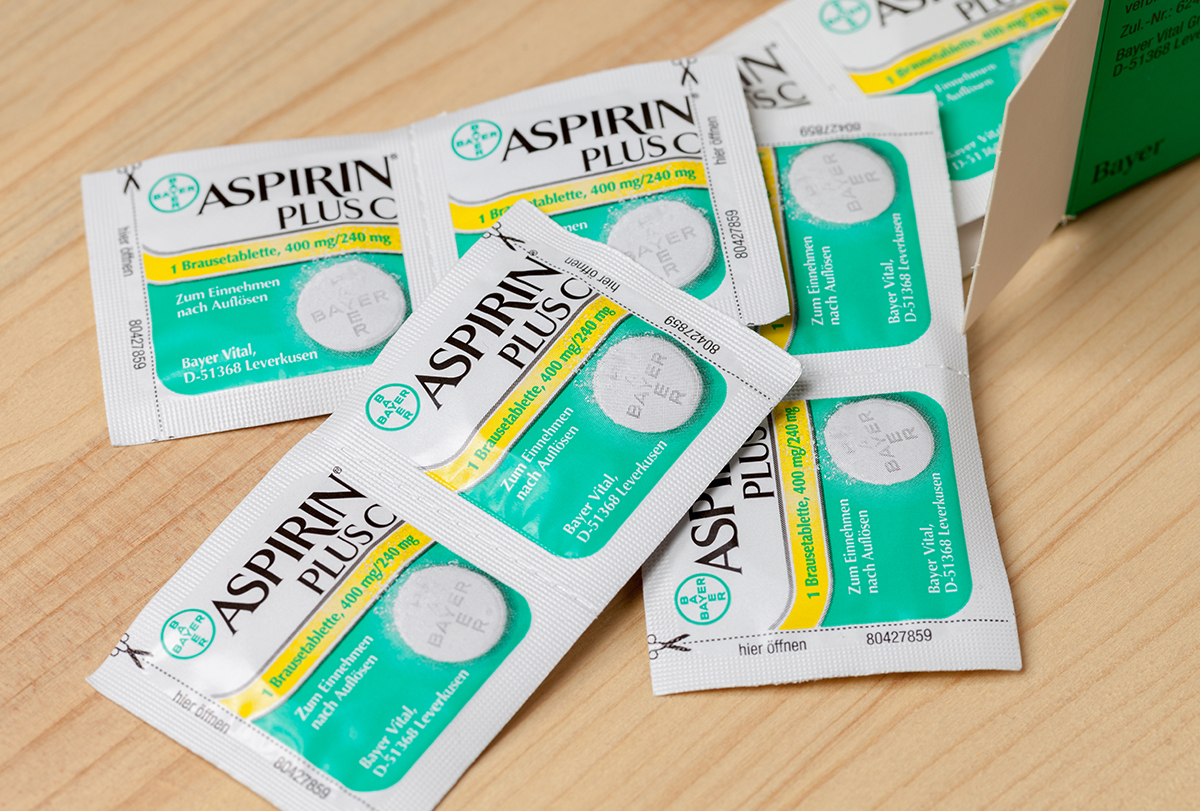
Moreover, aspirin works as an anticoagulant, or blood thinner, which can help dissolve blood clots in your blood vessels to restore proper blood flow in the body. Such blockages can cut off blood supply to the heart or brain and trigger a heart attack or stroke, respectively.
So, doctors often prescribe aspirin to reduce blood clotting (3) and thereby your cardiovascular risk. (4)
But this article will shed light on some of the lesser known topical uses of aspirin so that you can reap its full healing potential.
Topical Uses of Aspirin
Here’s how you can use aspirin to address a variety of common skin problems at home:
Note: Do a patch test before using these remedies.
1. Helps with acne
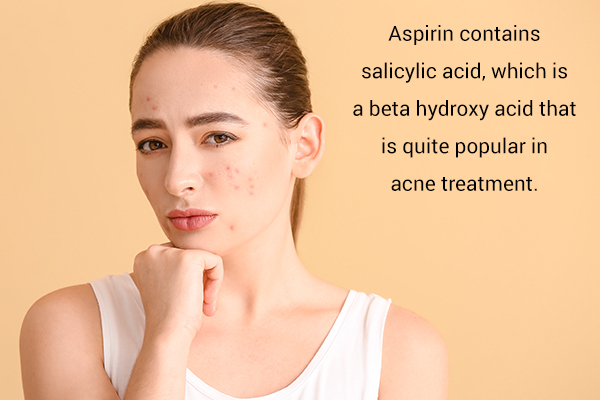
Aspirin contains salicylic acid, which is a beta hydroxy acid that is quite popular in acne treatment. When used topically, this active ingredient helps shrink your pimples and makes them hurt less by relieving the underlying inflammation. (5)(6)
How to use:
- Crush an aspirin tablet into powder and mix in a few drops of water to make a paste. If you have a full-blown breakout and have to cover a larger area, then mix 4 crushed aspirin tablets in 2 tablespoons of water to make the paste. (5)
- Apply the paste to the affected area.
2. Treats dandruff and scalp inflammation
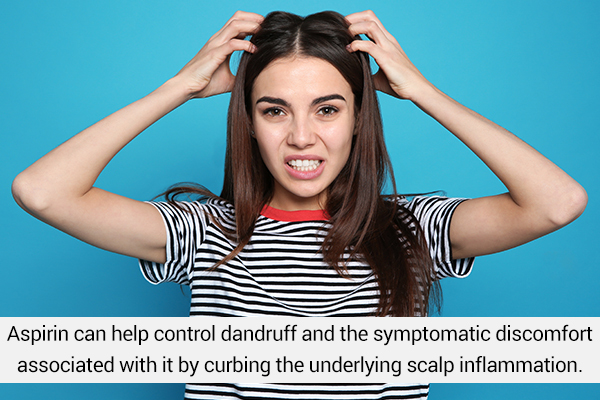
Dandruff triggers scalp inflammation, which leads to its characteristic symptoms: itching, redness, irritation, dryness, and flaking. (7)
Aspirin can help control dandruff and the symptomatic discomfort associated with it by curbing the underlying scalp inflammation.
Plus, the salicylic acid found in it helps dissolve and loosen the dead skin flakes settled on your scalp to facilitate their easy removal. It also helps lock moisture in your scalp to relieve the dryness and reduce flaking. (8) For these reasons, aspirin is often used in antidandruff shampoos and hair products.
If left untreated, dandruff and scalp inflammation can end up damaging your hair follicles, leading to excessive hair fall or even hair loss. Topical aspirin can help reduce the risk of such complications. (9)
How to use:
- Mix two crushed aspirin tablets in your shampoo.
- Use the shampoo as you usually would, massaging it all over your hair and scalp.
- Let it sit for 2 minutes before rinsing it off with plain water. (10)
3. Reduces corns and calluses
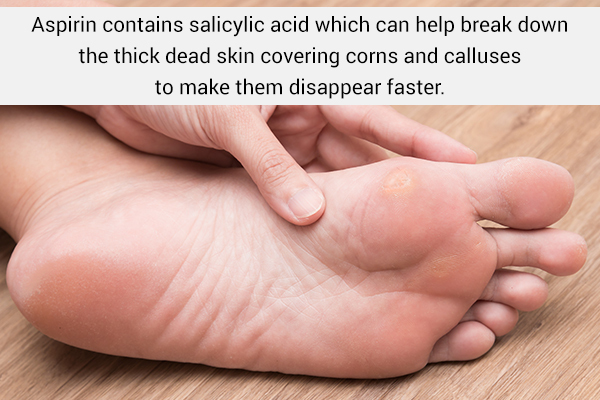
Corns and calluses are small patches of thick, hard skin that form over areas that undergo a lot of friction, strain, or irritation. They usually form on the most overused parts of the body such as the hands and feet, where the skin often rubs against hard surfaces.
The skin protects itself from this kind of physical trauma by forming extra scar tissue over the affected areas.
While these lesions are generally painless, they can hurt when pressed, which can make movement difficult. Plus, they are quite an eye sore.
Aspirin can help break down the thick dead skin covering corns and calluses to make them disappear faster. This is mainly due to the presence of salicylic acid, which dissolves the hardened skin and makes it slough off, revealing new healthy skin underneath.
How to use:
- Crush 5–6 aspirin tablets in a bowl.
- Pour in ½ teaspoon of water and ½ teaspoon of lemon juice.
- Mix all the ingredients to make a paste.
- Apply the paste to the corn or callus.
- Cover it with a warm cloth for 10 minutes.
- Wash it off with plain water.
4. Reduces keloids
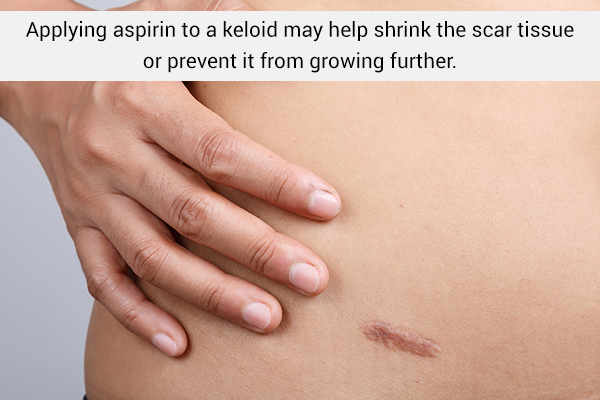
Keloids are thick, lumpy, raised scars that often grow larger than the wound and develop after the injury has healed. Excess collagen in the skin leads to the formation of extra scar tissue during the healing process, resulting in keloids.
Keloids are not a common problem and mostly affect dark-skinned individuals. (11) Applying aspirin to the keloid may help shrink the scar tissue or prevent it from growing further. (12)
How to use:
- Crush 1–2 aspirin tablets to make a powder.
- Mix in just enough water to make a thick paste that will stick to the skin.
- Apply it to the keloid.
- Once the paste dries, wash it off.
Final Word
Aspirin is not limited to its oral use, but it can also be used topically to address a variety of dermatologic conditions. (13)
Taking aspirin orally means that its anti-inflammatory effects will be distributed throughout the body, resulting in a systemic and gradual response. But when aspirin is applied to a specific area, its anti-inflammatory effect is concentrated in that spot, leading to faster skin healing.
Note that aspirin can have harmful side effects, especially when mixed with other products. In fact, the chance of side effects increases with each new product you use, (14) so use it judiciously.
- Was this article helpful?
- YES, THANKS!NOT REALLY


